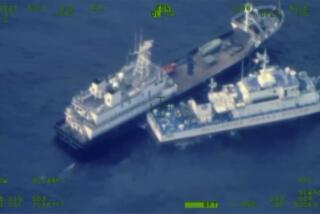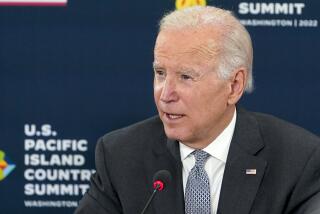U.S.-Philippine Bases Talks Appear Deadlocked : Diplomacy: No significant progress is made at the sixth round. The Washington negotiator is going home a day early.
- Share via
MANILA — A stormy year of negotiations over the future of strategic U.S. military bases in the Philippines, the cornerstone of bilateral relations, appeared badly deadlocked Thursday, with no significant progress after a sixth round of increasingly tense talks.
White House special negotiator Richard L. Armitage is to leave Manila this afternoon, a day earlier than planned, and a spokesman said he has no immediate plans to return. Both sides previously had billed the week as the final round of marathon talks that began last May.
U.S. officials were clearly frustrated as they prepared for the last day of scheduled talks. “There’ve been no major agreements,” said Stanley Schrager, spokesman for the U.S. panel. “There’ve been no major breakthroughs.”
For the first time, Philippine and U.S. officials said the stalemate--over how long U.S. forces can stay and how much Washington must pay for the privilege--may mean that no agreement is reached before the current leases for Clark Air Base and the Subic Bay Naval Base expire Sept. 16. The two bases are among America’s oldest and largest overseas.
U.S. officials said privately that they now are considering putting future talks on hold until a new, and presumably more agreeable, Philippine president and Senate are elected in May, 1992, to replace President Corazon Aquino’s divided and often chaotic administration.
Two leading presidential candidates, Defense Secretary Fidel V. Ramos and industrialist Eduardo Cojuangco Jr., a close associate of the late President Ferdinand E. Marcos, support extending the base leases. Several other candidates, in a rallying cry for nationalist sentiment, oppose the bases.
But Raul Rabe, spokesman for the Philippine panel, told reporters that the Philippines will face a “constitutional crisis” if U.S. forces stay past Sept. 17 without an agreement. The nation’s 1987 constitution requires that all foreign forces must leave by that date unless a treaty is signed.
“The situation may be a constitutional crisis for the Philippines,” Rabe said. “But it’s also a crisis for the U.S. side.”
U.S. officials argue that the 1947 bases agreement allows the Pentagon another year to disengage. But Schrager said the United States still hopes to sign an agreement by September.
Washington’s relations with Manila have soured steadily in the past year. Although President Bush sent U.S. Air Force jets aloft to help Aquino put down a coup attempt in December, 1989, she later refused to meet visiting Defense Secretary Dick Cheney and offered no support during the Persian Gulf military buildup.
Armitage and his staff met this week with anti-bases leaders in the Philippine Senate along with ambassadors and at least one senior member of Aquino’s staff in hopes of breaking the deadlock.
In addition, the Philippine trade secretary, Peter Garrucho, will fly to Washington to meet with Carla Anderson Hills, the U.S. trade representative, to discuss possible trade concessions to help the foundering economy. Aquino’s Cabinet secretaries of foreign affairs and finance previously have visited Washington but expected deals fell through both times.
“The problem is no one will make a decision here,” said one frustrated American official. “There’s no leadership.”
At a press conference, Schrager denied that the yearlong talks, which Armitage described Monday as an example of Bush’s “new world order,” have effectively collapsed. “There’s been nothing agreed to,” Schrager said. “But both parties understand each other better.”
The Philippines is demanding $825 million a year, including $400 million in fixed annual cash grants and $425 million in various credits and debt reduction, for a seven-year extension of leases. Officials say the money is needed to help solve the impoverished nation’s huge economic and development problems.
The United States wants to stay at least 10 years and has offered $360 million a year in appropriated military and economic assistance, plus $160 million in unappropriated development aid.
A series of daily private meetings this week between Armitage and Philippine Foreign Secretary Raul Manglapus, did little to bridge the gap.
“It’s a bloody war,” said one member of the Philippine panel. “Neither side is moving.”
While he said the Pentagon would accede to a formal demand to withdraw, an already skeptical Congress would probably see it as a hostile act and reconsider Manila’s status as the third-largest recipient of American foreign aid, after Israel and Egypt.
Clark and Subic, with a total of 40,000 service personnel and dependents, are considered a mainstay of American military power in Southeast Asia. The bases provided vital, if mostly unpublicized, logistic support during the Persian Gulf buildup and war.
More to Read
Sign up for Essential California
The most important California stories and recommendations in your inbox every morning.
You may occasionally receive promotional content from the Los Angeles Times.














